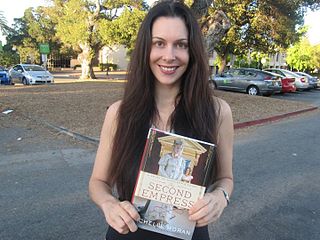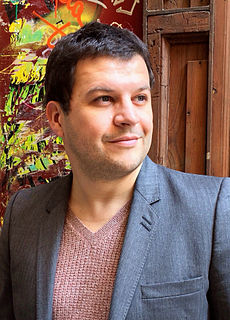A Quote by Michelle Moran
Her beauty might fascinate men, but it was difficult to charm them when she stood mute. . . .
Related Quotes
She tossed her towel on her dresser and turned to the bed where shed left her PJs. Only it wasn't just her PJs on the bed anymore. Lucas, eyes wide, sat on the foot of her bed, about four feet from where she stood completely naked. She squealed. He laughed. She dashed for the towel. Once she had it around her, she glared from a still grinning Lucas to the door. "I'm killing Della!" He laughed again. "I'm afraid I might have to protect her for this one.
When Vanity kissed Vanity, a hundred happy Junes ago, he pondered o'er her breathlessly, and, that all men might ever know, he rhymed her eyes with life and death: "Thru Time I'll save my love!" he said. . . yet Beauty vanished with his breath, and, with her lovers, she was dead. . . -Ever his wit and not her eyes, ever his art and not her hair: "Who'd learn a trick in rhyme, be wise and pause before his sonnet there". . . So all my words, however true, might sing you to a thousandth June, and no one ever know that you were Beauty for an afternoon.
For she was a child, throwing bread to the ducks, between her parents who stood by the lake, holding her life in her arms which, as she neared them, grew larger and larger in her arms, until it became a whole life, a complete life, which she put down by them and said, "This is what I have made of it! This!" And what had she made of it? What, indeed?
She came into a room; she stood, as he had often seen her, in a doorway with lots of people round her. But it was Clarissa one remembered. Not that she was striking; not beautiful at all; there was nothing picturesque about her; she never said anything specially clever; there she was however; there she was.
The thought that, insignificant as she was, she yet might do some good, made her very careful of her acts and words, and so anxious to keep head contented and face happy, that she forgot her clothes, and made others do the same. She did not know it, but that good old fashion of simplicity made the plain gowns pretty, and the grace of unconsciousness beautified their little wearer with the charm that makes girlhood sweetest to those who truly love and reverence it.
She stood, squared her shoulders. “We’ll do it. Together.” And then she did something that shocked them both. She rose on her tiptoes and pressed a swift kiss on his lips. “Thank you for returning to help me.” When she tried to move away, he latched onto her forearms and held her in place. His eyes were gleaming. "Next time you decide to do that…" What?" she said, stiffening. "Give you a little warning?" No." He grinned. "Linger.
The pain was as unexpected as a thunderclap in a clear sky. Eddis's chest tightened, as something closed around her heart. A deep breath might have calmed her, but she couldn't draw one. She wondered if she was ill, and she even thought briefly that she might have been poisoned. She felt Attolia reach out and take her hand. To the court it was unexceptional, hardly noticed, but to Eddis it was an anchor, and she held on to it as if to a lifeline. Sounis was looking at her with concern. Her responding smile was artificial.
I read a lot by female psychoanalyst Lou Andreas-Salomé, who wrote prominent biographies of Nietzsche, Rilke, and Freud because she studied with all of them. She had this unbelievable insight into contemporary psychoanalysis. What is so interesting is that she wrote her life, and she knew that her life would be about these men, and it didn't stop her from leading an incredibly successful academic career. But her strange self-awareness that she was going to bookmark these men's lives is really interesting to me.





































